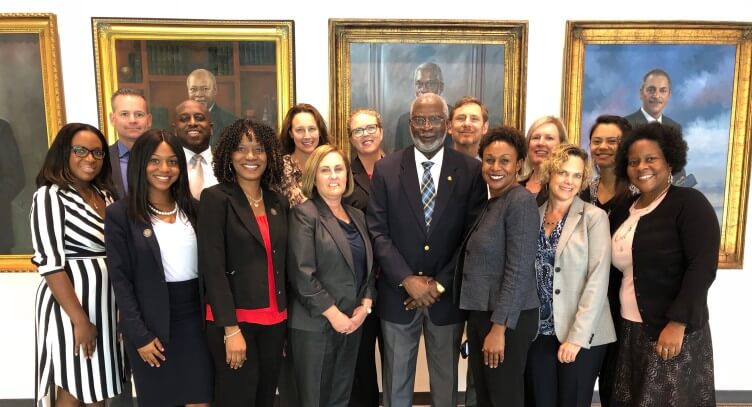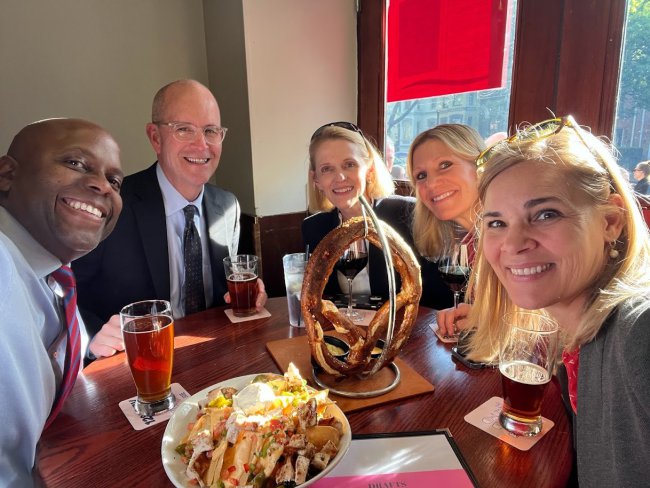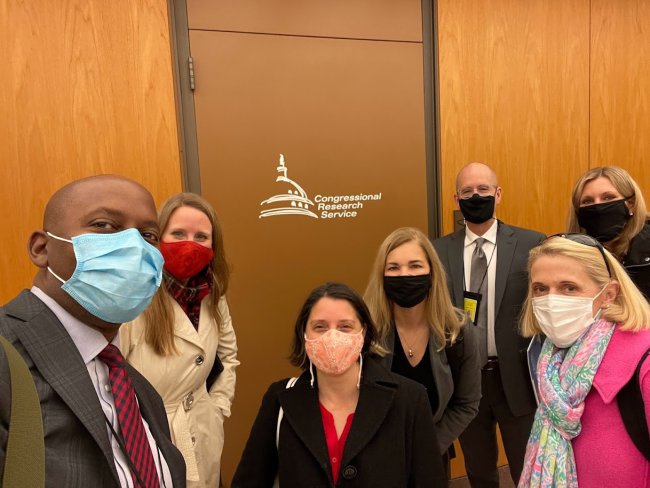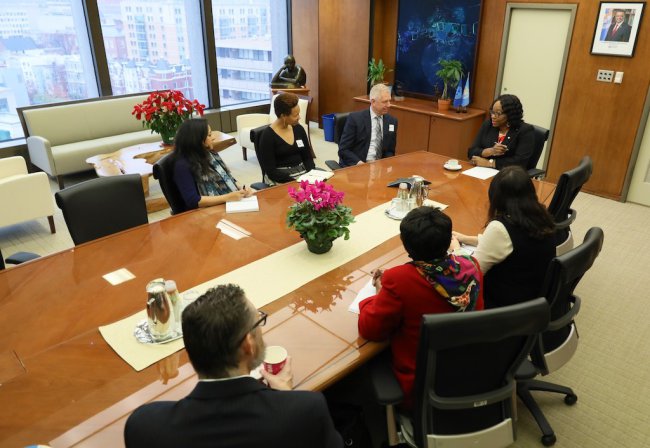“Transformative”: The RWJF Health Policy Fellows Orientation Is a Crash Course in American Health Policy

The 2018-2019 class of RWJF Health Policy Fellows meets with Dr. David Satcher, founder of the Satcher Leadership Institute at Morehouse School of Medicine and former U.S. Surgeon General and Assistant Secretary for Health.
By Marisa Coulton
Brian Williams was at the top of his field as a surgeon and was looking for a way to expand his impact beyond the patients that he cared for every day. “I was at a stage in my career where I just needed a nudge to get to that next level of impact. And I didn’t know how to make that happen or who to talk to, or where I’d get the skills for that,” he said.
“When I learned about this fellowship, I knew [it was] the perfect opportunity to bridge my past experience in medicine to do something more impactful in the future.”
Every year, the Robert Wood Johnson Foundation (RWJF) Health Policy Fellows program selects six mid-career professionals to leave their positions for a year and move to Washington, DC, the heart of American health policy. Williams is a member of the class of 2021-2022. When asked how he reacted to being selected for the program, he said, “I was floating.” He got the change he was looking for and more. It was a change of city, a change of role, and most importantly, a change of pace.
The RWJF Health Policy Fellows program started in 1973 and ever since, the only constant has been change. The program’s 3.5-month orientation period—which evolves continuously in line with fellows’ recommendations and the political challenges of the moment—is as dynamic as the American health policy landscape itself. Decades of innovation have resulted in an experience that the fellows refer to as “life-changing.”
Williams said he would have been satisfied even if the fellowship had consisted solely of the orientation. “If at the end, they said, ‘Brian, you have to go home now,’ I would have been okay with that. That’s how good the orientation was.”
“I just needed a nudge to get to that next level of impact. And I didn’t know how to make that happen or who to talk to, or where I’d get the skills for that.”
Pre-Orientation
Fellows selected for the program receive funding and support to relocate to Washington, DC. Many bring their families to the city to browse apartments and neighborhoods before they make the move. “Knowing you had a sneak peek of what it was going to be like in DC before you had to commit to a certain [residence]… That was really helpful,” said Kristin Ashford, a member of the class of 2021-2022.
Over the years, the fellowship program coordinators have become experts at planning the logistics of a cross-country move. “This is nothing new for [them]… they have this down to a fine art,” she said. “They knew what travel companies to reach out to, they provided you opportunities to ask questions.” As part of the pre-orientation, the fellows learned about the program from alumni, who shared their experiences and offered advice on where to live in the city.
Ashford and her cohort also had the chance to meet current fellows and attend their end-of-year policy presentations. “To get a sneak peak of what we would be expected to do at the culmination of our year—that was a great opportunity,” Ashford said.
The Orientation
The fellows arrived in Washington and began orientation in September. “I was so nervous initially that first day,” said Ashford. “I knew where I needed to be, what I needed to wear, what the expectation was. I felt like I was very well-equipped for the first day,” she said, but added that her feelings of excitement and uncertainty persisted until she arrived at the National Academy of Medicine (NAM) building and spotted fellowship director Gregg Margolis and deputy director Mona Rahman, ready to greet the incoming fellows with food and smiles. (The RWJF Health Policy Fellows program is administered by the NAM with funding support from RWJF.)
“I thought I had a reasonable understanding of health policy, then I got here and realized how much there was to learn.”
Margolis could relate to Ashford’s nervousness. He was a fellow himself before becoming director. Though roughly a decade has passed, he could recall his first day as a fellow distinctly. “I remember thinking, oh my gosh, I am in so far over my head,” he said. The program had taken him straight out of his comfort zone as a field and flight paramedic, professor, and policy leader, and had thrown him directly into the bustling world of health policy in the nation’s capital.
Not long into the orientation, he realized he didn’t need to worry; the RWJF Health Policy Fellows program would teach him everything he needed to know. “It was such an eye-opening experience,” he said. “I thought I had a reasonable understanding of health policy, then I got here and realized how much there was to learn.”
The orientation is “3-and-a-half months of learning from the nation’s top health policy thinkers and influencers,” he added. It spans September to December every year, and consists of well over 200 off-the-record “briefings”—a unique opportunity to have deep and candid conversations with renowned experts in health, health care, and health policy.
Each presenter, or “briefer,” has latitude to choose what they would like to discuss, so no briefing is the same. In the past, topics have included organizational priorities, legislative proposals, and issues such as the social determinants of health, health equity, and structural racism. The format can range from a detailed presentation, to an informal chat, and everything in between. The briefings are hard to define, said Margolis, because they are what the fellows and briefers want them to be. “It is a rare privilege to talk to a world’s leading expert on the day’s hottest topic in a confidential environment intended only for your education,” he said.
The briefers span the political spectrum and represent those who play a major role in the health policy world. “Many of them are notable names any health professional has probably heard of,” said Charlton Wilson, class of 2021-2022. In past years, speakers have included thought leaders such as Daniel Dawes, Nicole Lurie, Jack Ebeler, and David Michaels (who is also an alumnus of the program).
As is tradition in the RWJF Health Policy Fellows program, nothing is constant—not even the roster of briefers. “We give each cohort the opportunity to identify organizations and people that they want to hear from,” said Margolis. The lineup changes with each new cohort, who get to select about 20 percent of the briefers themselves.
“The opportunity to get to know them, to ask questions, and hear their perspectives is just second to none,” Margolis said. The agreement that the briefings are strictly off the record enables frank conversations about challenging issues. “You get a really unvarnished briefing when you are able to set it up in that way.”
“Policy doesn’t always go the way you intended. You put a policy in one community and it works great, and you put that same policy in another community and it’s an abysmal failure.”
Joe Antos, senior fellow at the American Enterprise Institute, speaks to the fellows often. He prefers his briefings to be informal, because “with a different setting, you get a different sort of conversation,” he said. His briefings generally take the form of a “free-floating discussion of current policy topics,” during which Antos tries to impart to the fellows some understanding of what it takes to get agreement on Capitol Hill.
Like Antos, Georges C. Benjamin, executive director of the American Public Health Association (APHA), always gives the fellows his honest views. “I try to point out to them that policy doesn’t always go the way you intended,” he said. “You put a policy in one community and it works great, and you put that same policy in another community and it’s an abysmal failure.”
Benjamin typically discusses several topics with the fellows, but the conversation generally centers on the evolution of health policy in the 20 years that he has been at the APHA. He also makes sure to highlight the errors he has made so that the fellows know what to avoid as they kickstart their policy careers. “I want them to make their own mistakes,” he said. “Not repeat the ones that I have. I want them to come up with some brand-new ones.”
He has been a briefer for several years now, and said that the fellows have always struck him as “well trained, all smart, very much interested in policy.”
The briefings are enjoyed by briefers and fellows alike. “Many say it’s their favorite hour of the year,” said Rahman. “They get a chance to impart what their organization is doing to six health care leaders who are then going to take that knowledge and do great things.” The briefings set the stage for a fruitful partnership. Benjamin said he routinely runs into fellows and has developed a networking relationship with many of them.
A Professional Network
“A major objective of the orientation is to build the fellows’ network of subject matter experts, of influencers, thought leaders, organizations, and stakeholders,” said Margolis, “so that they have that network to draw on not only for their placement experience but for their policy work after the fellowship.”
The purpose of the briefings, then, is twofold: they allow the fellows to learn what major health policy organizations do and how they work together, but they also enable the fellows to build a far-reaching network of expert health policy leaders that they can draw on throughout their careers.
“There are complexities. You can come in and not really know how Washington works. The answer is not as easy as it seems.”
Williams was thrilled by the opportunity to engage with the briefers in a small-group setting and have their full attention for an hour or more. “It’s hard to explain how valuable that is to us, and to someone like me, who just wants to learn,” he said.
The fellows are united by a common love of learning. “I’m wired to really like to learn new things. I always like to be growing in some way,” said Ann Sheehy, class of 2021-2022. Despite her years of experience in teaching and advocacy, she said, “I’ll never know enough information.”
It’s part of what makes the sessions so enjoyable for the briefers. “I just found them incredibly receptive and interesting,” said Mary Agnes Carey of the fellows. Carey is co-founder of Kaiser Health News and a former member of the fellowship’s advisory committee. When she briefs the fellows, she often discusses relevant topics like abortion and drug pricing. She tries to shed light on the country’s most contentious health care issues to show the fellows that the answer is not always cut-and-dry. “There are complexities. You can come in and not really know how Washington works,” she said. “The answer is not as easy as it seems.”
“Bonded for Life”
As the orientation progresses, the fellows inevitably find themselves getting closer to one another. Williams said that spending time with his cohort was his favorite part of the experience. “From day one, we just meshed,” he said. “We will be bonded for life, I know that.”

Members of the class of 2021-2022.
Margolis is proof of this; he’s still in touch with the fellows from his class. “We’ve all remained close,” he said. “You spend such an intense period of time together, and it’s such an amazing year. These people become your lifelong friends and colleagues.”
The fellowship program is nonpartisan, which means that the fellows’ political orientations can vary. But that didn’t stop the current cohort from becoming fast friends. “Amongst us, that was just never an issue,” said Williams. “If you didn’t tell me that someone was a Republican or a Democrat, I wouldn’t know.” In the orientation, political divisions tend to fall away as the fellows work toward a common goal of advancing health policy.
The fellows learn just as much from one another as they do from the briefers, Rahman said. Because they have built trust and camaraderie throughout the orientation, the fellows are particularly open to views that might conflict with their own. Disagreements remain civil and never turn into arguments.
“If you didn’t tell me that someone was a Republican or a Democrat, I wouldn’t know.”
“There has never been a time when it’s been contentious,” Sheehy said. “In fact, it’s been the exact opposite of that. I’ve had really great experiences with people who have a little bit of a different perspective. You learn from that,” she said. “I think it’s easy to get into your silo and surround yourself with people who maybe agree with you on all issues. It’s really important to hear from people who have a slightly different take on something.”
For Ashford, the discussions cemented her existing beliefs at times, and at other times, changed her perspective entirely. During the orientation, she and the other fellows were assigned readings that equipped them with the academic foundation necessary to weigh the different viewpoints they were being presented.
“Back to School”
What started out as a reading list in early days of the program has since evolved into a regular, interactive book club. The fellows read a handpicked selection of health policy literature and gather in an informal, small-group setting to discuss the content.
In keeping with the program’s tradition of dynamism, many of the titles change on a yearly basis in line with the fellows’ feedback and the ever-evolving political environment. There are a few seminal works of literature, however, that have remained on the list over the years, including, The Heart of Power: Health and Politics in the Oval Office by David Blumenthal and James Morone, The Healing of America: A Global Quest for Better, Cheaper, and Fairer Health Care by T. R. Reid, and Governing Health: The Politics of Health Policy by William G. Weissert and Carol S. Weissert.
“You’re in a small-group learning environment with people you’ve grown to love and trust,” said Wilson. “It leads to revelations and learning that you otherwise would not have had by reading the book alone.”

Members of the class of 2021-2022 visit the Congressional Research Service.
The fellowship encourages a dramatic shift in perspective, an opportunity rarely afforded to midcareer professionals, Wilson added. When they begin the program, the fellows often transition from a senior role at the top of their field to being a student again, an experience that can be as jarring as it is enriching. “All of a sudden, you’re not responsible for your department, or your business, or whatever it happens to be,” said Wilson. “Now you’re responsible for yourself and learning.”
While years of experience can help you become a better health professional, it’s easy to get stuck in a silo, said Rahman. “They’ve worked in a certain area and that’s where their focus is, so to pull back from that and learn from other health care leaders is really valuable.”
For Williams, being back in the classroom required little adjustment. “It was like putting on a glove. It felt good,” he said. The academic aspects of the orientation are particularly enjoyable, he added, because fellows get to enjoy all the personal and professional benefits of studying without the stress of papers or exams.
The RWJF Health Policy Fellows don’t stay in the classroom for long. They visit and tour federal departments and agencies, organizations, think tanks, academic institutions, the Centers for Disease Control and Prevention, and the White House. These hands-on visits, coupled with the briefings and readings, equip the fellows with everything they need for the next step: their placement in a congressional or executive branch office.
“Getting a really well-placed health policy job on the Hill is extremely hard. It is extremely competitive.”
By the time they start work on Capitol Hill, their eyes have been opened, and it shows. “They’re all very bright and engaged, and they seem to genuinely enjoy their experience, and are less jaded than the usual congressional staff that we interact with,” said Atul Grover, briefer and executive director of the AAMC Research and Action Institute think tank. “There’s a real optimism and energy that they bring to the offices they work with.”
“The Beating Heart of Policy”
Frederick Isasi, executive director of Families USA, has interacted with the RWJF Health Policy Fellows in different capacities for the past 15 years. He often meets with them for coffee and is happy to offer advice when they finish the fellowship and are trying to figure out their next move. He has even hired some alumni of the program.
“Getting a really well-placed health policy job on the Hill is extremely hard. It is extremely competitive,” Isasi said. “What the RWJF Fellowship does, is it basically cuts through so many layers that are obstacles to getting in there. It really just cracks open the Hill for these midlevel and more senior professionals, to get right into the beating heart of policy and legislation.”
To help them make the transition, the RWJF Health Policy Fellows program taps into its longstanding partnership with the American Political Science Association (APSA), which provides fellows with a rich foundation in political science throughout the orientation.
“We bring in not only health policy experts, but political science experts,” said Margolis. “The fellows really learn and understand not only the health policy but the underlying political science that really impacts how policy is made, and what the various policy options are in our political system and the context in which decisions are made.” The fellows also get the chance during the orientation to mingle with the APSA Congressional Fellows program.
The fellows learn about Congress, elections, lobbying groups, the role of political parties, and more. But it’s one thing to understand how these elements operate, and quite another to be a part of them, tasked with conveying complex messages to the media, Congress, and colleagues on the Hill.
“When I watch the news, I see it differently now. When I read the paper, I interpret what I’m reading differently.”
In order to refine their strategic communication skills, the fellows undergo a rigorous “media boot camp,” which includes a mock interview with a seasoned journalist. The mock interview helps them “take their expertise and make sure that they are able to convey their stories in a short and concise way that is right for the media,” said Rahman.
With all of the modules, seminars, and meetings, it would be easy to get overwhelmed, but the program coordinators set aside time for weekly “Review and Reflect” sessions with the fellows so they can digest everything they have learned. “They end up meeting with over 200 people, but the ‘Review and Reflect’ is an opportunity to make connections between all of the meetings they’re having,” said Margolis. These sessions are the glue that pulls everything together. “It’s about seeing the big picture.”
Williams sees it. “When I watch the news, I see it differently now. When I read the paper, I interpret what I’m reading differently, and that’s all because of the orientation,” he said. “Having a better idea of how things function, how decisions are made, how policy becomes reality, it’s been transformative.”
The orientation is bound to be equally as transformative for next year’s cohort, but in different ways, as the programming will evolve in parallel with the health policy landscape. In an orientation so dynamic, it’s no wonder each fellow departs as a completely different person than when they entered, with a newfound understanding of their role in the ever-changing health policy ecosystem.
“How I view health care in this country, and how it interacts globally, how I view my role as a trauma surgeon within a healthcare system, and how that links to the broader federal policy legislation: it’s all changed,” Williams said.
Applications for the 2023-2024 class of RWJF Health Policy Fellows are open September 8 through November 7, 2022. Learn more at HealthPolicyFellows.org
Follow the RWJF Health Policy Fellows program on LinkedIn or email info@healthpolicyfellows.org to get in touch.
About the Author: Marisa Coulton is a journalist based in Montreal, Canada. She holds a Master of Journalism and a Master of International Affairs from Columbia University.


